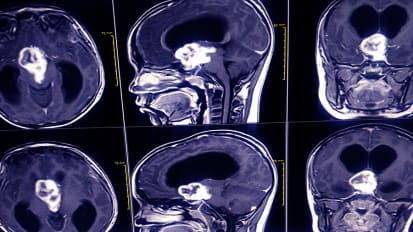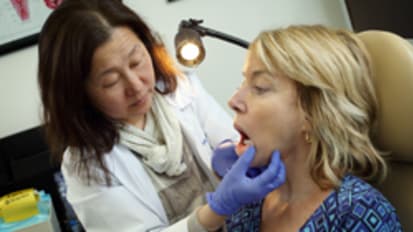Search
 Video
Video
Artificial Iris Implant Restores Visual Function
Karolinne Rocha, M.D., performs MUSC Health's second artificial iris implant after performing first in country after FDA approval in 2018. News
News
Game-Changer: How a Simple Quest Led to a Discovery That Promises to Change Lives
Laura Ensign set out to develop a formula to improve the absorption of eye drops, but when she and her team began looking at data on their new formula, they made a stunning discovery. News
News
Artificial Corneas: A Glimmer of Hope Through the Cloud
Sightline Special Edition Annual Report 2014 News
News
How a Routine Eye Exam Found a Brain Tumor and Saved a Patient’s Life
What began as a routine eye exam turned into a collaboration between the USC Roski Eye Institute and the USC Brain Tumor Center to save a patient’s life. News
News
A Revealing Biopsy for Sjogren’s Syndrome
HeadWay April 6, 2015 News
News
Hopkins researchers chart a course for AI-aided diagnosis of degenerative eye conditions
An interdisciplinary team discovers that machine diagnostics using deep learning can match the performance of human ophthalmologists News
News
Johns Hopkins Research Suggests Ways to Improve the Medicare Annual Wellness Visit
A new study from Johns Hopkins researchers offers caution about the limitations of the Medicare Annual Wellness Visit, finding that up to 25% of older adults at risk for falls still were prescribed a medication that is considered high risk for that condition. News
News
Holistic Treatment for CSF Disorders
NeuroLogicDecember 1, 2015
 News
News
How Could Intravitreal VEGF Target Wet Age-Related Macular Degeneration More Effectively?
Could a New lntraocular Treatment Platform Offer Hope for Patients with Wet Age-Related Macular Degeneration? Video
Video
Plaque Placement for a Choroidal Melanoma
MUSC Health ophthalmologist George N. Magrath, M.D., narrates video footage showing the placement of a radioactive plaque to treat choroidal melanoma. Course
Course
Retinopathy of Prematurity (ROP): Treatment and Results
Dr. Harper reviews the options for retinopathy of prematurity treatment; recent advancements in diagnostic evaluation and treatment considerations and results. News
News
Rapid Response to Immune-Related Adverse Events Improves Patient Care
Published results of a Johns Hopkins pilot study showed 73.5% of physicians in the study said recommendations from an immune-related toxicity (IR-tox) team changed their diagnosis or management of immune-related adverse events.